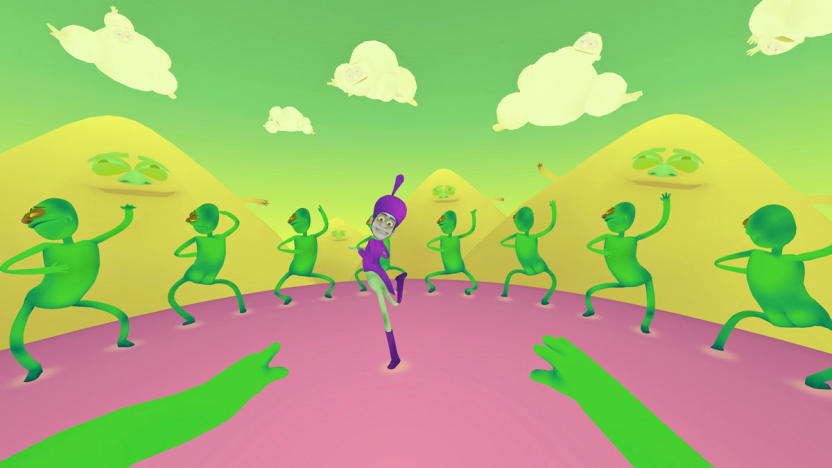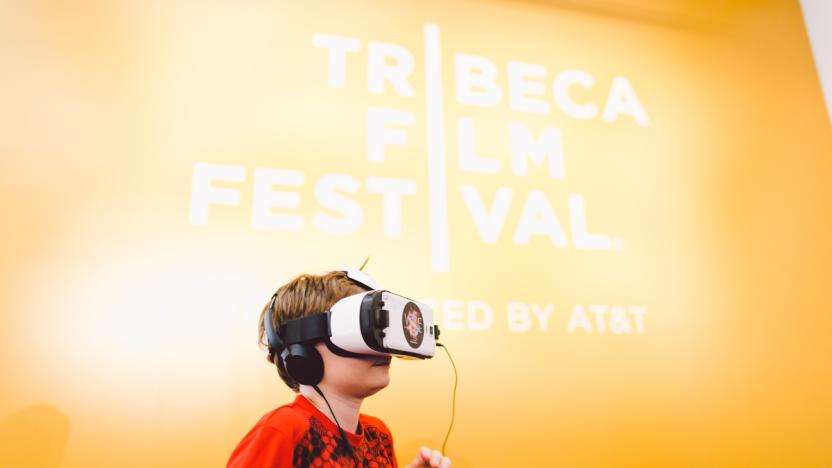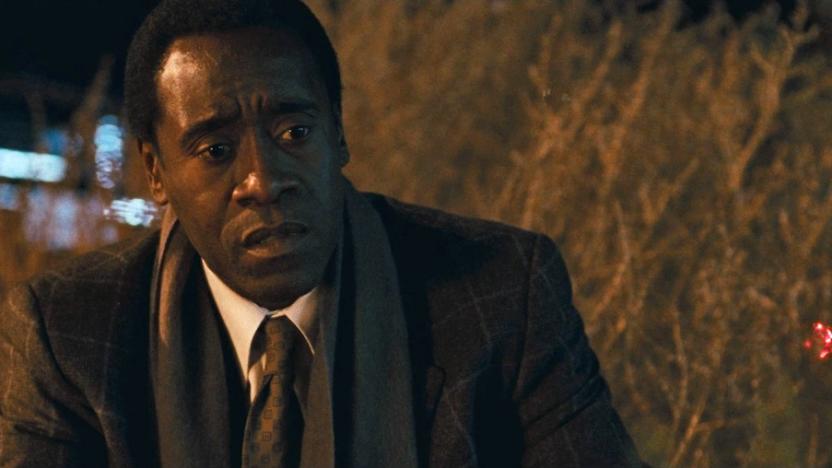tribecafilmfestival
Latest

If video killed the radio star, VR slayed it
There's nothing in virtual reality quite as rapturous as exiting Tyler Hurd's "Old Friend" for the first time. The up-tempo, computer-animated experience, backed by up-and-coming VR studio Wevr, is a three-minute long, hyperactive, confetti-filled romp through a neon-hued world of happy clouds, little naked green men (who wouldn't look out of place on the set of The Muppets) and one very determined marching band leader. It's essentially a dance party set to the Future Islands track for which the VR piece is named, and it stars you, the viewer, as a squiggly armed raver. In a way, it does for VR what The Buggles' "Video Killed the Radio Star" did for MTV: It defines a whole new genre for a whole new medium. Think of it as the next phase in the evolution of the music video.

At Tribeca, this little VR match girl put Penrose on the map
Loosely based on Hans Christian Andersen's The Little Match Girl, Allumette, the latest virtual reality short to come from Penrose Studios, isn't some Disney-fied experience for children. Though set in a whimsical, cloud-borne city and populated by charming and mute marionette-like denizens, the short -- named after the French word for "match" -- is actually a surprisingly mature allegory about love, loss and the sacrifices parents make for their children. It's but one piece of a greater interactive virtual world Penrose is creating.

Tribeca Film Festival wants to normalize VR for the masses
Genna Terranova wants virtual reality to feel "commonplace." That is, she wants to make it normal. Terranova, who serves as the director of the Tribeca Film Festival, thinks now is the time to break VR out of its headline-stealing sideshow and make it accessible to the general public. And with a mix of 23 VR exhibits and installations planned for the fest's upcoming slate this April in New York, she's on track to do just that. "Yes, the Gear [VR] is out there and Oculus [Rift] is coming, but it's still a bit rarefied as far as the general public goes," says Terranova. "So we want to create a place where people can really explore this and not feel intimidated by it. But also create a space where you can experience these individual pieces and then have conversations about them."

Tribeca and Lionsgate's video-streaming service is now available
It took almost a year to get here, but Tribeca and film distributor Lionsgate have finally launched their paid video-streaming service. Shortlist, as the on-demand product is called, will have a $5 monthly subscription fee and give users access to over 150 "critically acclaimed" movies. Among them are Crash, City of God, Chasing Amy, Fargo and The Producers, to mention a few. Right now, Tribeca Shortlist is only available on the web and for iPad, although we're told it'll be available on the iPhone, Fire TV and Roku later this year, as well as Apple TV and Android in 2016. Tribeca, which is the company behind the Tribeca Film Festival, says the $5 price is set to stay until the end of 2015, but then it plans to increase it to $6. Nevertheless, if you're interested in seeing what it has to offer, you can sign up for a free trial.

How cheap VR helped a Stanford professor bring his dream to Tribeca
Last year, the Tribeca Film Festival began highlighting new mediums being used in storytelling, and that trend has translated over to 2015. Virtual reality is, naturally, a big part of this movement, as filmmakers start creating more content for consumer-grade devices like the Oculus Rift, Samsung Gear VR and Google Cardboard. This is why the current edition of the event is hosting Stanford's Virtual Human Virtual Interaction Lab, a venture started in 2003 by Jeremy Bailenson, who's a professor at the university and has been working on digital human representation since 1999. It features a set of VR experiences that attendees can check out, all with the same goal of transporting you into another reality.

Video games can drive social change, if they grow up first
Games for Change president Asi Burak has noticed an odd trend in the gaming industry. Gaming is growing rapidly as a form of entertainment and it's entering a space of serious artistic critique, where people from other fields of entertainment recognize its potential to influence real-world events. Here's the odd part: Opposition to sophisticated critique of video games tends to come from within the gaming industry itself, Burak says. He runs through a few potential reasons for this phenomenon: It's the nature of gaming to be edgy and anti-establishment. It's a young industry. It saw rapid commercial success and now doesn't want to derail its prosperous ways. It's historically an underground kind of field, not used to a spotlight that could reveal flaws alongside beauty. "For all those reasons, social responsibility and real-world issues are not the core of the gaming industry," Burak says. "And I think it's interesting because when you look at other media, it's always the case [that they're socially aware]."

Tribeca Film Festival welcomes a tech-driven change in storytelling
Storytellers are finding new mediums, like mobile apps, virtual reality headsets and web-based products, to convey their narratives. Of course, events like Sundance and Tribeca Film Festival are the perfect place to exhibit any fresh or interesting project, where people can actually experience them firsthand. And they all have one thing in common: The key is to make you part of the story. At Storyscapes, an exhibit at the Tribeca Film Festival that showcases immersive creations, we came across some that caught our eye. For example, a couple use VR to express the director's message, another an app and, in the case of Door Into the Dark, a 6,000-square-foot labyrinth that relies on audio to guide those who try it. Sounds like fun, right? Don't worry: You, too, can check these out if you happen to be in New York City from today, April 16th, through April 19th.

Embracing the future: Tribeca Film Festival goes beyond its roots
As has been the case since 2002, this year brought thousands of movie buffs to New York City for the Tribeca Film Festival. While at its core, the festival is still very much rooted in providing a platform for film creators to show off their latest productions, the event itself has grown to be about more than just films. This year, TFF introduced a few new technology-focused initiatives, in hopes of providing more options for both filmmakers and the media. That, coupled with panels, interactive events and, of course, the late-night parties, makes the festival one not to be missed.

Netflix data didn't feed House of Cards' success, 'the bliss of ignorance' did
The opening scene of the Netflix original House of Cards, in which a dog is killed by the lead character, certainly isn't for the faint of heart. So much so that some people made the decision to stop watching right as Frank Underwood finished saying he has "no patience for useless things," and ended the canine's life shortly after it had been run over and left to suffer on the street. And if you've watched the show, then you know Frank wouldn't be Frank without doing such unsettling things. Yes, it was a powerful and very risky way to kick off a new style of series, but it is one that set the tone for the House of Cards we've now become familiar with, regardless of how appalling it may have been. For Beau Willimon, the man responsible for turning an old UK TV series into a show based on American politics, if you can't handle that scene, then you're not meant to watch the show.

Joystiq interviews the "Good Versus Wiivil" creators
Jack Paccione Jr. is one happy guy. Of course, he did just get sent to the Top of the Rock in New York City to show off his short film to the influential members of the Tribeca Film Festival community. Having an extra $10,000 in his pocket certainly must feel nice as well. How did he get there? He won Nintendo's short film competition, Shortcuts, with his film "Good Versus Wiivil."The film turned a happy-go-lucky Carvel employee into a human mannequin controlled by a Wii Remote. But, what would happen when an evil Wii Remote (the titular "Wiivil") interfered? The incredible concept was backed by fantastic production values, and great performances. We had a chance to talk to Jack Paccione Jr., Jerry White, and Robert McCormack from Escape Goat Pictures to hear more about the production of the winning short film.What inspired the concept behind the film?Paccione: Well, I never thought seriously about there being an evil Wii Remote. But, with all our short films we want to get into some kind of conflict as quickly as possible. So, the Wii is a really fun, happy place, and we wanted to mess around with that a little bit, and figure out its dark side. And there we go. That's how it came together.



